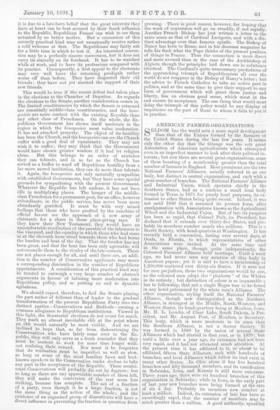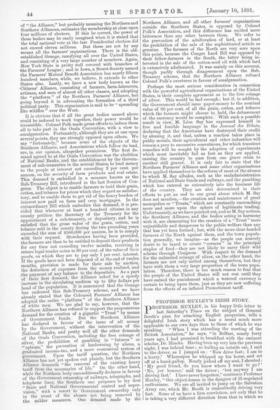AMERICAN FARMER-ORGANISATIONS.
SELDOM has the world seen a more rapid development than that of the Unions formed by the farmers of the United States during the last few years. It seems only the other day that the Grange was the sole great Association of American agriculturists which attempted even in an imperfect manner to look after their political in- terests; but now there are several great organisations, some of them boasting of a membership greater than the total number of farmers in England. Most prominent are the two National Farmers' Alliances, usually referred to as one body, but distinct in central organisation, and each with a great number of branches. The National Farmers' Alliance and Industrial Union, which operates chiefly in the Southern States, had as a nucleus a small local body formed in Texas in 1875 for purely local purposes, its ex- tension to other States being quite recent. Indeed, it was not until 1889 that it assumed its present form, after amalgamation with Associations known as the Agricultural Wheel and the Industrial Union. But of late its progress has been so rapid, that Colonel Polk, its President, has declared that it extends over thirty-five States, and pro- bably its members number nearly two millions. This is a Secret Society, with head-quarters at Washington. It has recently held a convention, lasting over several days, at Ocala, in Florida, to which representatives of other Associations were invited. At the same time and in the same place, though quite independently, the Coloured Farmers' Alliance held meetings. Until a week ago, we had never seen any mention of this body in American papers ; yet it is said to have a membership of 1,200,000 scattered over thirty-six States. If it were not for race prejudices, these two organisations would. be one, as the coloured men adopt the "platform" of the Whites in its entirety ; but distinction of colour is so impassable a bar to fellowship, that not a single Negro was to be found in any hotel patronised by the white men's Alliance. The other organisation, styling itself the National Farmers' Alliance, though now distinguished as the Northern Alliance, is strongest in the Middle, North-Western, and Western States, its head-quarters being at Moulton, Iowa. Mr. H. L. Loucks, of Clear Lake, South Dakota, is Pre- sident, and Mr. August Post, of Moulton, is Secretary. This body, which is more moderate in its aims than the Southern Alliance, is not a Secret Society. It was formed in 1880 by the union of several State Alliances which had started in that year, or in 1879 ; but until a little over a year ago, its extension had not been very rapid, and it had not attracted much attention. At the present time it has affiliated to it, or about to be affiliated, fifteen State Alliances, each with hundreds of branches, and local Alliances which follow its lead exist in many other States. In Ohio alone it has five hundred branches and fifty thousand members, and its ramification in Nebraska, Iowa, and Kansas is still more extensive.. Three years ago, there were six hundred. branches of this organisation in Nebraska ; while in Iowa, in the early part of last year new branches were being formed at the rate of six a day. Probably its members now number at least a million. Indeed, its extension of late. has been so exceedingly rapid, that the number of members may be much greater than a million. A good authority, speaking of " the Alliance," but probably meaning the Northern and Southern Alliances, estimates the membership at close upon four millions of electors. If this be correct, the power of these bodies may be easily imagined when it is stated that the total national vote at the last Presidential election did not exceed eleven millions. But these are not by any means all the farmers' organisations. There is the old- established Grange, ramifying all over the United States, and consisting of a very large number of members. Again, New York State is pretty well covered with branches of the Farmers' League i • and in Iowa, a Secret Society named the Farmers' Mutual Association has nearly fifteen hundred members, while, we believe, it extends to other States also. Lastly, we have a new body known as the 'Citizens' Alliance, consisting of farmers, farm-labourers, artisans, and men of almost all other classes, and adopting the " platform " of the Northern Farmers' Alliance, but going beyond it in advocating the formation of a third political party. This organisation is said to be " spreading .like wildfire " over the West.
It is obvious that if all the great bodies named above could be induced to work together, their power would be irresistible. Colonel Polk made great efforts to induce them all to take part in the Ocala Convention, with a view to amalgamation. Fortunately, although they are at one upon several points, they are strongly opposed upon others. We say "fortunately," because some of the objects of the Southern Alliance, and Associations which follow its lead, are, in our opinion, altogether pernicious. The first de- mand agreed to at the Ocala Convention was the abolition of National Banks, and the establishment by the Govern- ment of sub-treasuries in the several States, to lend money to the people at interest not exceeding 2 per cent. per annum, on the security of farm products and real estate. This demand is embodied in a measure known as the Sub-Treasury Bill, introduced in the last Session of Con- gress. The object is to enable farmers to hold their grain, .cotton, and tobacco for prices which they regard as satisfac- tory, and to enable them to get rid of the heavy burden of interest now paid on farm and crop 'mortgages. In the extraordinary Bill which embodies this demand, it is pro- Tided that whenever at least a hundred citizens in any county petition the Secretary of the Treasury for the appointment of a sub-treasury, or depository, and he is satisfied that the gross value of the grain, cotton, and tobacco sold in the county during the two preceding years exceeded the sum of $500,000 per annum, he is to comply with their request. Storehouses having been provided, the farmers are then to be entitled to deposit their products for any time not exceeding twelve months, receiving in return legal-tender notes to 80 per cent. of the value of their goods, on which they are to pay only 1 per cent. interest. Jf the goods have not been disposed of at the end of twelve months, provision is made for their sale by auction, the deduction of expenses from the money realised, and the payment of any balance to the depositors. As a part of their first demand, the Alliance asked for a speedy increase in the circulating medium up to fifty dollars per head of the population. It is announced that the Grange has endorsed this Sub-Treasury scheme, and we have already stated that the Coloured Farmers' Alliance has adopted the entire " platform " of the Southern Alliance of white men. We are glad to say, however, that the Northern Alliance has refused to support the preposterous demand for the creation of a gigantic " Trust " by means of Government funds. But the Northern Alliance has declared in favour of the issue of all money by the Government, without the intervention of the National Banks, and pretty well all the other demands .of the Ocala Convention, including the free coinage of :silver, the prohibition of gambling in " futures " or "options," the prevention of landowning by aliens, a graduated income-tax, and a more economical system of government. Upon the tariff question, the' Northern Alliance has not yet spoken out plainly, but the Southern Alliance demands " the removal of the existing heavy tariff from the necessaries of life." On the other hand, while the Northern body unconditionally declares in favour of the Government ownership of railways, telegraphs, and telephone lines, the Southern one proposes to try first State and National Governmental control and super- vision," with a resort to Government ownership only in the event of the abuses not being removed by the milder measures. One demand made by the Northern Alliance, and all other farmers' organisations outside the Southern States, is opposed by Colonel Polk's Association, and this difference has excited more bitterness than any other between them. We refer to the prevention of the adulteration of lard, or at least the prohibition of the sale of the sophisticated article as genuine. The farmers of the North are very sore upon this point, because the Conger Lard Bill was opposed by their fellow-farmers in the South, the latter being in- terested in the sale of the cotton-seed oil with which lard is extensively adulterated. It was mainly on this account, though partly through disagreement upon the Sub- Treasury scheme, that the Northern Alliance refused Colonel Polk's overtures in favour of amalgamation.
Perhaps the most serious consideration in connection with the powerful agricultural organisations of the United States, is their complete agreement as to the free coinage of silver. This would be bad enough ; but if, in addition, the Government should issue paper-money to the nominal value of 80 per cent. of all the grain, cotton, and tobacco which the farmers might choose to hold, the debasement of the currency would be complete. With such a possible result in view, M. Lilon Say has expressed himself in free and forcible language in the Journal des D4bals, declaring that the Americans have destroyed their credit by abusing it, and that, unless a reaction takes place in public morals, their agricultural and other industries will remain a prey to successive convulsions, for which transient remedies will be sought by the adoption of experiments which must inevitably fail as fast as they are applied, causing the country to pass from one grave crisis to another still graver. It is only fair to state that the Northern Farmers' Alliance and some other organisations have applied themselves to the reform of most of the abuses to which M. Say alludes, such as the maladministration of National and State funds and railways, and the gambling which has entered so extensively into the business life of the country. They are also determined in their efforts to put an end to one great abuse which M. Say does not mention,—the creation and maintenance of great monopolies or " Trusts," which are constantly encroaching more and more upon the sphere of legitimate trading. Unfortunately, as we have pointed out, and as M. Say notices, the Southern Alliance, and the bodies acting in harmony with it, are clamouring for the creation of a " Trust " more unjustifiable and dangerous to the public welfare than any that has yet been formed ; but, with the more clear-headed farmers of the North against them, and the town popula- tion generally, we imagine—as the people can scarcely desire to be taxed to create " corners " in the principal staples of food—they are not likely to carry their wild scheme through Congress. With respect to the demand for the unlimited coinage of silver, on the other hand, the farmers are not only united among themselves, but they have with them a very large proportion of the town popu- lation. Therefore, there is too much reason to fear that the people of the United States will not rest until they have earned the punishment which a watered currency is certain to bring upon them, just as they are now suffering from the effects of an inflated Protectionist tariff.

































 Previous page
Previous page